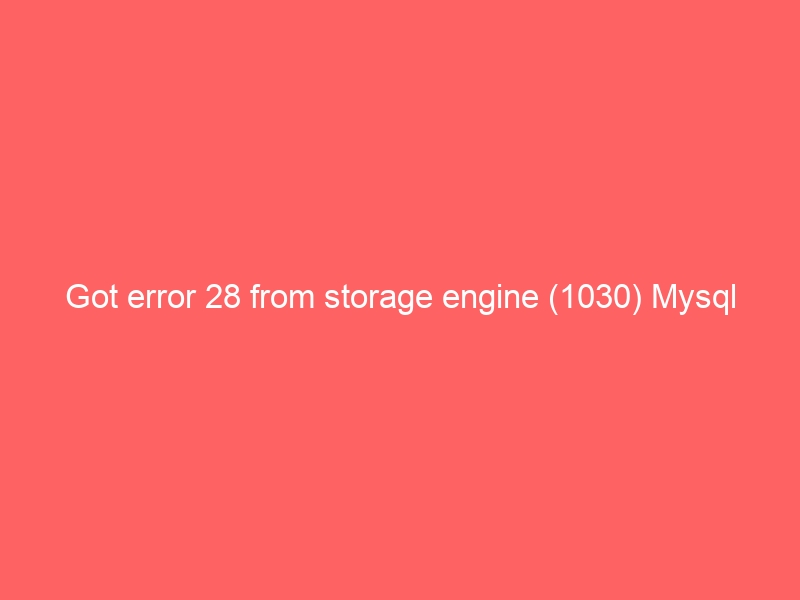While working on clients server today I got the error on database while making backup of all the database using mysql dump
The error was ” Got error 28 from storage engine (1030)”
root@hostonline [/tmp]# mysqldump –all-databases > all_databases.sql &
[1] 19341
root@hostonline [/tmp]# mysqldump: Couldn’t execute ‘SHOW TRIGGERS LIKE ‘phpbb\_posts”: Got error 28 from storage engine (1030)
After doing bit of googling I could see the error is due to lack of disk space or inodes in the hard disk or partition
I could see it was due to lack of space in /tmp
I increased the /tmp size using below steps
root@hostonline [/tmp]# /etc/init.d/cpanel stop
Stopping tailwatchd: [30832] [2015-09-10 01:27:18 -0500] [main] Current process ‘25903’ stopped
[ OK ]
Stopping cPanel services: [ OK ]
Stopping cPanel dav services: [ OK ]
Stopping cPanel queue services: [ OK ]
Stopping cPanel brute force detector services: [ OK ]
Stopping cPanel log services:
Stopping cPanel Chat services: [FAILED]
Stopping cPanel ssl services: Waiting for (?^:^(?:stunnel$|stunnel-[0-9\.]+local)) to shutdown … not running.
[ OK ]
root@hostonline [/tmp]# /etc/init.d/mysql stop
Shutting down MySQL…… [ OK ]
root@hostonline [/tmp]# /etc/init.d/httpd stop
httpd stopped
root@hostonline [/tmp]# umount -l /tmp
root@hostonline [/tmp]# umount -l /var/tmp
root@hostonline [/tmp]#
root@hostonline [/tmp]#
root@hostonline [/tmp]# mv /usr/tmpDSK /usr/tmpDSK_back
root@hostonline [/tmp]# vi /scripts/securetmp
Now change tmpdsksize paramater to 2048000
Save file and now run below command
root@hostonline [/tmp]# /scripts/securetmp
Would you like to secure /tmp & /var/tmp at boot time? (y/n) y
Would you like to secure /tmp & /var/tmp now? (y/n) y
Securing /tmp & /var/tmp
Calculating size on /tmp
/tmp calculated to be 4096 M based on available disk space in /usr
No separate partition for tmp!
Building /usr/tmpDSK…4194304+0 records in
4194304+0 records out
4294967296 bytes (4.3 GB) copied, 37.5703 seconds, 114 MB/s
mke2fs 1.39 (29-May-2006)
/usr/tmpDSK is not a block special device.
Proceed anyway? (y,n) Filesystem label=
OS type: Linux
Block size=4096 (log=2)
Fragment size=4096 (log=2)
524288 inodes, 1048576 blocks
52428 blocks (5.00%) reserved for the super user
First data block=0
Maximum filesystem blocks=1073741824
32 block groups
32768 blocks per group, 32768 fragments per group
16384 inodes per group
Superblock backups stored on blocks:
32768, 98304, 163840, 229376, 294912, 819200, 884736
Writing inode tables: done
Writing superblocks and filesystem accounting information: done
This filesystem will be automatically checked every 36 mounts or
180 days, whichever comes first. Use tune2fs -c or -i to override.
tune2fs 1.39 (29-May-2006)
Creating journal inode: done
This filesystem will be automatically checked every 36 mounts or
180 days, whichever comes first. Use tune2fs -c or -i to override.
Done
Setting up /tmp… Done
Setting up /var/tmp… Done
Checking fstab for entries …Done
Logrotate TMPDIR already configured
Process Complete
root@hostonline [/tmp]# /etc/init.d/cpanel start
Starting cpanel:
Waiting for cpaneld to shutdown … not running.
Waiting for webmaild to shutdown … not running.
Waiting for cpdavd-ssl to shutdown … not running.
Waiting for cpanellogd to shutdown … not running.
Waiting for entropychat to shutdown … not running.
Waiting for eximstats to shutdown … not running.
mailmanctl: no process killed
Waiting for eximstats to shutdown … not running.
[+] No running cPGreyList process found.
You may be running this update interactively from within WHM.
It is necessary we restart cpsrvd, but this will kill the session displaying update progress.
Please see the logs in /var/cpanel/updatelogs/ for further information if the update progress stops
==> SMTP Mail protection has been enabled.
All outbound SMTP connections will be redirected to localhost except:
uid is root (ports: 25,26,465,587)
uid is cpanel (ports: 25,26,465,587)
gid is mail (ports: 25,26,465,587)
gid is mailman (ports: 25,26,465,587)
The “cphulkd” service is disabled.
root@hostonline [/tmp]# /etc/init.d/httpd start [ OK ]
httpd starting
root@hostonline [/tmp]# /etc/init.d/mysql start
Starting MySQL [ OK ]
root@hostonline [/home]# mysqldump –all-databases > all_databases6.sql
Mysqldump is ready now :)





